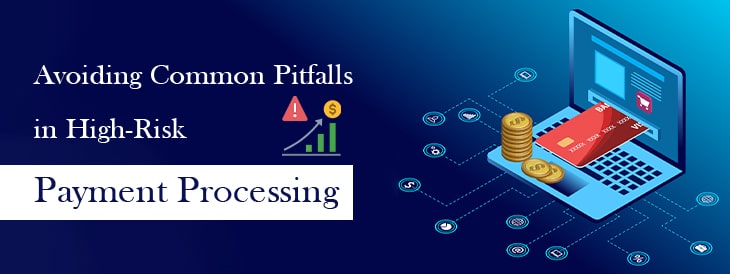Avoiding Common Pitfalls in High-Risk Payment Processing
Avoiding Common Pitfalls in High-Risk Payment Processing

Grasping the Concept of High-Risk Payment Processing
In the world of e-commerce and online transactions, not all businesses face the same level of risk. Some industries, due to their nature, face higher risks when it comes to payment processing. These businesses are often labeled as “high-risk” by payment processors. Industries like adult entertainment, online gambling, travel, and subscription services typically fall into this category. The main reason these industries are considered high-risk is due to factors such as a higher incidence of chargebacks, legal regulations, or the potential for fraud.
Understanding the complexities of high-risk payment processing is crucial for businesses to avoid common pitfalls. This involves recognizing why certain businesses are deemed high-risk and what this status entails. Essentially, high-risk payment processing involves stricter scrutiny from financial institutions, higher fees, and more stringent contract terms. By grasping this concept, businesses can better prepare to navigate these challenges and focus on finding suitable solutions to overcome them.
Some Related Blogs
- How to Choose the Right High-Risk Payment Processor for Your Business Needs
- How to choose the right business funding option for your high-risk business
- How to comply with PCI DSS regulations
- The Benefits of Using a Payment Processor That Specializes in High-Risk Businesses
Selecting the Ideal Payment Processor
Choosing the right payment processor is essential for high-risk businesses to manage potential risks and optimize payment operations. One of the first considerations should be industry specialization. Processors that focus on high-risk industries are better equipped with the necessary experience and infrastructure to address unique challenges.
Fee structures are another critical factor. High-risk payment processors typically charge higher fees due to the increased risk they assume. It’s important to compare different processors to find a balance between cost and service quality. Look closely at the various fee components, such as transaction fees, chargeback fees, and monthly fees, to get a full understanding of the total cost.
Fraud prevention capabilities should also be a priority. A processor that offers advanced fraud detection and prevention tools can significantly mitigate the risk of fraudulent transactions. Features like real-time monitoring, machine learning algorithms, and comprehensive reporting can provide an added layer of security for your business and customers.
Customer support is indispensable in high-risk industries. Issues can arise at any time, making it crucial to have access to reliable support. Look for a payment processor that offers 24/7 customer service, so you can quickly resolve any problems that may occur.
Additionally, the reputation of the payment processor is important. Researching online reviews, industry forums, and customer testimonials can offer valuable insights into the processor’s reliability and effectiveness. A well-reputed processor will have a proven track record of helping high-risk businesses manage payment challenges successfully.
Integration capabilities should not be overlooked. The payment processor should seamlessly integrate with your existing systems, such as your e-commerce platform, accounting software, and customer relationship management (CRM) tools. Easy integration can streamline operations and improve overall efficiency.
Lastly, consider the contract terms. High-risk payment processors may impose stringent contract conditions, so it’s essential to read and understand the terms thoroughly. Look out for long-term commitments, early termination fees, and other conditions that could impact your business flexibility.
Handling Chargebacks Successfully
Chargebacks can pose a significant challenge for high-risk businesses. They arise when customers dispute transactions, leading to a reversal of funds. Common reasons for chargebacks include fraudulent activities, customer dissatisfaction, and confusion over billing details.
To tackle chargebacks effectively, businesses should prioritize clear communication. Ensure customers are fully aware of terms of service, billing descriptions, and refund policies to prevent misunderstandings.
Implementing advanced fraud detection tools is another crucial step. Utilizing software that can identify and halt suspicious activities before they escalate into chargebacks can save businesses time and resources.
Exceptional customer service also plays a vital role. Addressing complaints and concerns promptly can prevent disputes from progressing to chargebacks. Maintaining an open line of communication with customers can help resolve issues before they escalate.
Regular monitoring of chargeback ratios and transaction patterns is essential. Keeping a close eye on these metrics allows businesses to spot potential problems early and take corrective action swiftly.
By focusing on these strategies, high-risk businesses can effectively manage and reduce the incidence of chargebacks, ensuring smoother operations and better relationships with payment processors.
Maintaining Compliance with Regulatory Standards
Operating in a high-risk industry means navigating a complex regulatory environment. Key regulations affecting high-risk payment processing include the Payment Card Industry Data Security Standard (PCI DSS) and anti-money laundering (AML) laws. Compliance with these standards is not just a legal requirement but also a way to build trust with customers and financial partners.
To ensure compliance and avoid penalties, businesses should take the following steps:
- Understand Relevant Regulations: Stay informed about the regulations affecting your industry and ensure that all aspects of your payment processing adhere to these rules.
- Implement Security Measures: Protect customer data by implementing strong security protocols, such as encryption and secure data storage.
- Conduct Regular Audits: Regular compliance audits can identify potential vulnerabilities and areas for improvement.
- Employee Training: Ensure that all employees involved in payment processing are well-trained in compliance requirements and best practices.
By maintaining compliance with regulatory standards, high-risk businesses can avoid hefty fines and protect their reputations in the market.
![]()
Email us anytime!
Email customer service 24/7 at info@binarygateways.com
![]()
Call us anytime!
Reach customer care 24/7 at (801) 761-5001
